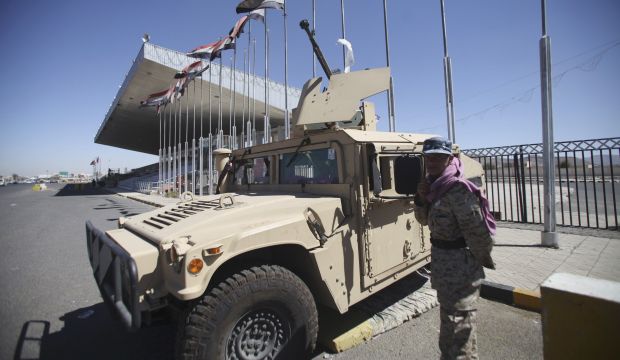
A Houthi fighter in army uniform stands to the door of a military vehicle which was seized from the army during recent clashes, outside an entrance to the presidential palace in Sana;a, on February 8, 2015. (REUTERS/Mohamed al-Sayaghi)
“This is most likely an attempt to subdue both these provinces under the control of the putschists,” the source said, referring to the Houthis, and adding that the group would use the pretext of quelling “takfirist” elements in the area to justify carrying out the raids in oil-rich Ma’rib and Al-Bayda.
Authorities in both provinces, like others in Yemen, have been vocal opponents of the Houthi advance across the country in recent months as well as the movement’s decision last week to take the reins of power in the capital Sana’a.
The Houthis dissolved parliament and set up a Revolutionary Committee to form an interim presidential council to fill the vacuum left by outgoing president Abd Rabbuh Mansur Hadi, as well as a new parliament and government.
In addition to the authorities, local tribes in both Mar’rib and Al-Bayda have also expressed opposition to the Houthis, with Ma’rib’s tribes promising to defend the region against the movement, whose members have reportedly been attempting to surround the oil-rich province.
Meanwhile, rifts have begun to surface within the Revolutionary Committee over the makeup of the country’s new parliament, a source close to Houthi leader Abdul Malik Al-Houthi told Asharq Al-Awsat.
The source said there had been disagreement over representatives from provinces openly opposed to the Houthi’s declaration, and who have said will no longer act on any instructions received from Sana’a, where the Houthis hold sway.
The Houthis began their power grab in September of 2014 when they seized government and military facilities following a month-long series mass protests and sit-ins in the capital by thousands of the group’s followers.
The group then signed an agreement with Hadi to halt the escalations, but nonetheless continued to advance across the country.
Many in Yemen believe the Houthis have been aided by military and political figures still loyal to the country’s former president, Ali Abdullah Saleh, who has reportedly struck a pact with the group behind the scenes.
Iran has also been blamed by many observers both inside and outside Yemen for supporting the Shi’ite movements bid for power in an attempt to increase its influence in the region.
The UN, meanwhile, has called for the reinstatement of Hadi as the country’s president and urged all political factions in Yemen to resolve the crisis through dialogue.
On Sunday, UN Secretary-General Ban Ki-moon said talks between UN special envoy Jamal Benomar and the Houthis and other groups in the country would continue on Monday, calling on all sides to negotiate “in good faith and in a spirit of compromise.”
